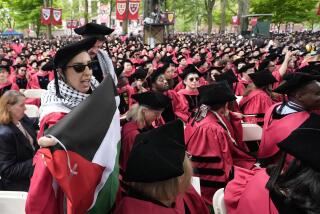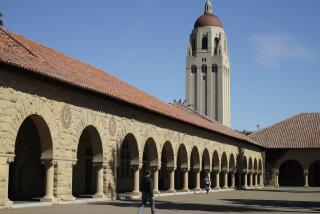Harvard Student Gets Custody of Child
- Share via
In a child custody case that has drawn national media attention as it raised questions about the rights and responsibilities of young, unmarried parents, a family law commissioner ruled Tuesday that a single mother with a Harvard University scholarship can return to school with her daughter.
While noting that “the law doesn’t give us a specific acid test for how to determine custody,” Long Beach family law Commissioner John Chemeleski ruled that a Harvard degree is in the “best interests” of Gina Ocon, 21, and her 10-month-old daughter, Bailey.
Bailey’s father, Tommaso Maggiore, had argued that it was unfair of Ocon to move Bailey 3,000 miles from him. His lawyer said in court that Ocon was “selfish” and could easily attend a well-regarded college closer to home. Maggiore, 21, questioned whether she would be able to juggle her books and her daughter’s needs, even with Bailey in day care.
“I thought all along I could do it,” Ocon said as she faced a wall of television cameras on the courthouse steps afterward. “And I will prove to each and every person who doubted me that I can do it.”
With the judge’s permission, Ocon will fly to Cambridge to find housing, day care and other support that will help her as a single mother in the Ivy League. She will return to the campus with her daughter for the start of the fall semester.
As Ocon and her parents celebrated outside the courthouse with lawyer Gloria Allred, Maggiore and his family left without speaking to reporters.
Maggiore’s attorney, Robert Gasper, said his client was “very upset” and had not decided whether to appeal the ruling. Gasper suggested that the case might have turned out differently if his client had been the one who wanted to relocate with the child to pursue an education.
Allred, who took over the case from Ocon’s previous attorney the day after it was described in a Times article, hailed the ruling as a victory that underscores single mothers’ rights to self-determination. While the custody battle was covered by media from “Dateline NBC” to “Inside Edition,” it resonated with the bitter back-and-forth of everyday child custody disputes.
In court, Gasper, accused Ocon’s mother of disparaging Maggiore’s parents. Allred in turn alleged that the Maggiore family’s Rottweiler posed a threat to the child’s safety.
Beyond the dispute over who would win custody of the child, the case touched on the value of a Harvard education.
“If it was Ball State, would we be here?” asked Gasper, who noted that Chelsea Clinton recently passed up Harvard for Stanford.
In the end, Chemeleski agreed with a court evaluator, who wrote that Ocon should continue to be the child’s primary caretaker. Maggiore, the evaluator wrote, should enter a 12-step program to cope with problems that resulted in two arrests for alcohol-related offenses in December 1996. The commissioner set a June 19 hearing on whether Maggiore, who works as a waiter at his parents’ restaurant, will have to pay child support and Ocon’s attorney fees.
Ocon and Maggiore never intended to wind up as parents, much less opponents in a courtroom, when they started dating in the summer of 1995. Ocon had just completed her first year at Harvard, and Maggiore was working at his Long Beach waiter’s job. When Ocon returned to Cambridge in the fall, she discovered that she was pregnant and came back to Southern California.
After the child was born in June 1996, the couple flew to Cambridge to look for an apartment, but said they could not find an affordable one and put off their plans again. A few weeks and at least one heated argument later, Ocon moved out and took Bailey with her. Maggiore filed for custody, he said in a recent interview, because he feared that Ocon was trying to “leave me out of the picture.”
A court order kept both parents from leaving California with Bailey.
Unable to reclaim a scholarship package that covered Harvard’s $20,600 tuition and another $10,000 or so in expenses, Ocon began receiving a $453 monthly check from Aid for Families With Dependent Children.
Responding to questions raised in media coverage about why she applied for welfare instead of getting a job, she said she was not receiving financial support from Maggiore but needed money to feed and clothe the child.
But in an interview after Tuesday’s decision, she said she has continued to receive welfare over the last few months because she worried that if she had a job, Maggiore would argue that she was too busy to care for the child. “It was a strategic decision,” she said.
In court Tuesday, Allred argued that losing the chance to attend Harvard could condemn Ocon to a life of “menial” jobs as a single mother without a degree.
Gasper said that Ocon would still be able to “excel” at a local college, and that she should “give up a good opportunity” to keep Bailey close to both parents.
After the ruling, Ocon said she hoped that Maggiore would move to Massachusetts to maximize the amount of time that he can spend with the child. She said the couple would work out a visitation schedule that would give him more time with Bailey during summer vacations and school holidays.
Harvard officials estimate that only a dozen or so of the school’s 6,500 undergraduates are parents. In Ocon’s case, the school has offered to pay for medical insurance for the child on top of the scholarship. Ocon expects to be in class about 12 hours a week and said she will devote the time she would have used for clubs and other extracurricular activities to her daughter.
“Bailey is not a mistake,” Ocon said. “There are no mistakes. There are only learning opportunities.”
More to Read
Sign up for Essential California
The most important California stories and recommendations in your inbox every morning.
You may occasionally receive promotional content from the Los Angeles Times.










